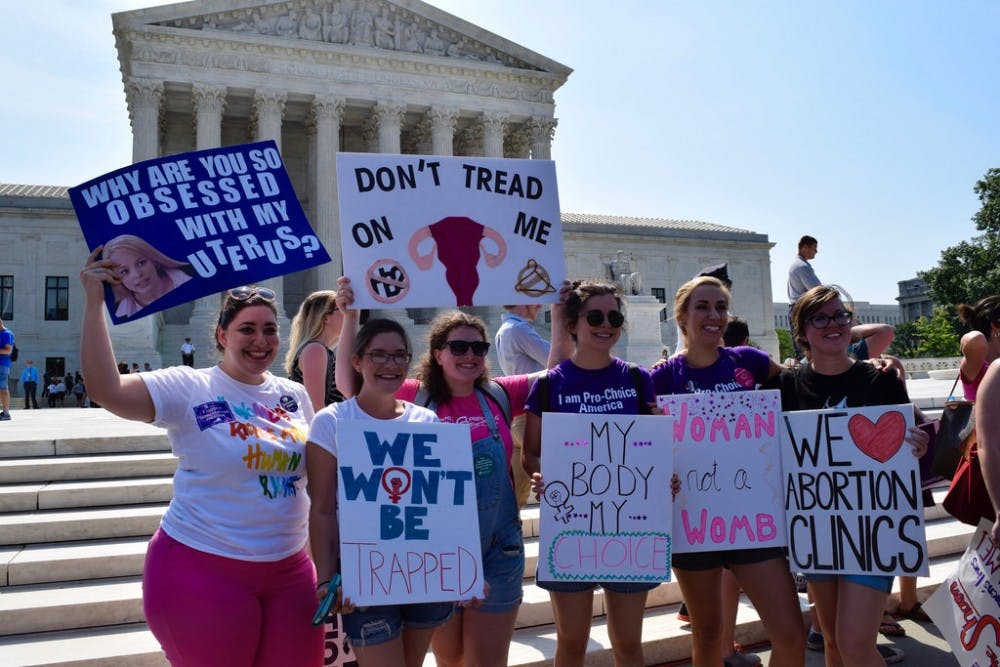The Trump administration submitted a rule to bar groups which offer abortions or provide abortion referrals from partaking in Title X funding. It was first introduced in May 2018 and was submitted on Feb. 7 to the Office of Information and Regulatory Affairs for final review.
Title X provides funding for clinics which offer family planning and preventive health services. It allocates more than $250 million for reproductive health-care services, such as birth control, for approximately four million people each year. Currently, it prohibits clinics from using those funds to provide abortions.
Under the proposed rule, health centers are still allowed to use nonfederal funds for abortions. However, it requires that clinics receiving federal funds maintain a “bright line” of physical and financial separation between clinics which support or offer abortion services.
The rule is modeled after measures instituted under the Reagan administration which banned any mention of abortion. It also prevents physicians and other health-care providers from referring patients to abortion clinics or offering abortion as a treatment option.
The regulation does allow for limited exception. If a pregnant patient explicitly requests a referral to an abortion clinic, then the physician will be allowed to provide a list of providers. However, they will not be able to indicate specifically which provider offers abortion services.
Doctors can also refer women who need abortions for emergency care, such as in cases where the pregnancy threatens the mother’s life. One example is if a woman has an ectopic pregnancy, in which the fertilized egg implants outside the uterus.
Marjorie Dannenfelser, president of the Susan B. Anthony List, an anti-abortion organization, stated that the rule would not affect the services offered through Title X.
“The Protect Life Rule does not cut family planning funding by a single dime, and instead directs tax dollars to entities that provide healthcare to women but do not perform abortions,” Dannenfelser said in a statement. “The Title X program was not intended to be a slush fund for abortion businesses.”
Critics characterize the regulation as a “gag provision.” Some claim that it is meant to indirectly target Planned Parenthood. Planned Parenthood serves about 41 percent of Title X patients and receives about $60 million in federal funds to provide services such as cancer screenings, birth control and screenings for sexually transmitted infections. The rule is expected to redirect millions in funding from the group to anti-abortion, faith-based ones.
Dr. Leana Wen, the president of Planned Parenthood and former Baltimore City health commissioner, condemned the regulation. She said that Planned Parenthood would not accept funds under the new rule.
“The gag rule is unconscionable and unethical. This rule compromises the oath that I took to serve patients and help them with making the best decision for their own health,” Wen said in a press release. “Imagine if the Trump administration prevented doctors from talking to our patients with diabetes about insulin. It would never happen. Reproductive health care should be no different.”
In response to the rule, Rep. Elijah Cummings and Senators Kamala Harris, Maggie Hassan and Patty Murray, sent a letter to the director of the Office of Management and Budget and the administrator of the Office of Information and Regulatory Affairs on Feb. 15.
The letter raises a few concerns. It claims that the Department of Health and Human Services (HHS) disregarded health-related consequences of the bill and failed to conduct a cost-benefit analysis.
They also criticize the denial of requests to extend the comment period on the regulation despite what they describe as a significant opposition of 200 members of Congress, more than 20 state and local health departments, and 500,000 members of the public.
“Given the many concerns raised by experts and stakeholders, the significant public health and economic implications of the rule, and the troubling irregularities of the regulatory process, we request that OIRA return the rule to HHS so that it can perform a comprehensive regulatory impact analysis and provide stakeholders additional opportunity for public comment,” the letter reads.
The administration passed a similar measure in January called the Mexico City policy, which is known to opponents as the “global gag rule.” The rule prevents non-governmental agencies which provide abortion counseling or referrals, or advocate for expansion or decriminalization of abortion services, from receiving U.S. foreign aid.





